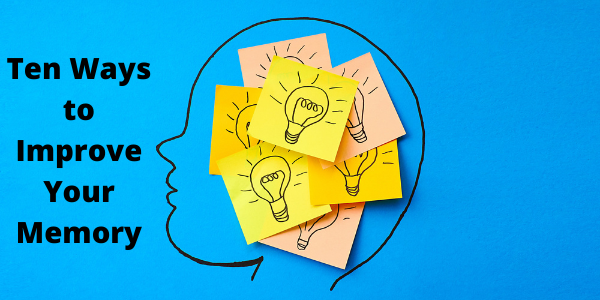Memory Improvement Tips for Studying

This article will teach you memory improvement tips for studying. As students, we often find ourselves struggling to memorize important information for exams or retain knowledge for long-term use.
Fortunately, there are numerous memory improvement tips and techniques that can help us study smarter, not harder. In this article, we’ll explore some of the most effective strategies for improving memory and enhancing learning retention.
Understanding How Memory Works
Before we dive into the tips and techniques, it’s important to understand how memory works. Our brains have two types of memory: short-term memory and long-term memory. Short-term memory allows us to hold onto small amounts of information for a short period of time, such as remembering a phone number just long enough to dial it. Long-term memory, on the other hand, allows us to store information for extended periods of time, such as remembering your childhood home or your best friend’s name.
When we try to remember something, the information is first encoded in our brains. This involves transforming the information into a format that can be stored, such as a visual image or a sound. Next, the information is stored in either short-term or long-term memory. Finally, when we need to recall the information, it is retrieved and brought back into our conscious awareness.
How Can I Study With Poor Memory?
What Are The 3 R’s Of Memory?
Why Am I Not Retaining Information When Studying?

There are several reasons why you may not be retaining information when studying. Some of the most common reasons include:
- Lack of attention: If you’re not fully engaged in your study sessions, it can be difficult to retain information. This can be due to distractions such as your phone, social media, or other environmental factors.
- Ineffective study techniques: Simply reading through material or highlighting passages may not be enough to effectively retain information. You may need to use techniques such as active recall, spaced repetition, and mnemonic devices to improve retention.
- Stress and anxiety: If you’re feeling stressed or anxious, it can affect your ability to remember information. This can be due to the release of cortisol, a stress hormone, which can impair memory function.
- Lack of sleep: Sleep is essential for memory consolidation, so if you’re not getting enough restful sleep, it can affect your ability to remember information.
- Health conditions or medications: Certain health conditions and medications can affect memory function, so if you’re experiencing memory problems, it’s a good idea to consult with a healthcare professional.
To improve your ability to retain information when studying, try addressing these factors by:
- Eliminating distractions and creating a study-friendly environment.
- Using effective study techniques such as active recall and spaced repetition.
- Reducing stress through techniques such as meditation or exercise.
- Getting enough restful sleep.
- Consulting with a healthcare professional if you suspect a health condition or medication may be affecting your memory function.
Memory Improvement Tips and Techniques
-
Pay Attention
One of the most important things you can do to improve your memory is to pay attention to the information you are trying to learn. When you are studying, eliminate distractions and focus solely on the material. This will help you encode the information more effectively and increase the chances that it will be stored in your long-term memory.
-
Use Multiple Sensory Modalities
Another effective memory improvement technique is to use multiple sensory modalities when studying. For example, if you are trying to learn a new concept, try to visualize it in your mind’s eye while simultaneously saying it out loud. This will engage both your visual and auditory senses, making it easier for your brain to encode and retrieve the information.
-
Break It Down
When studying complex information, it can be helpful to break it down into smaller, more manageable pieces. This will make the material easier to remember and can also help you identify any areas that you need to spend more time studying.
-
Repeat and Review
Repetition is key when it comes to improving memory. Try to repeat the information you are trying to learn multiple times, and also review it regularly to reinforce the memory. This can be especially effective when combined with other memory techniques, such as visualization or association.
-
Use Mnemonics
Mnemonics are memory aids that can help you remember information more easily. Examples of mnemonics include acronyms, songs, and rhymes. By associating the information you are trying to remember with something else, such as a catchy tune, you can make it easier for your brain to retrieve the memory when needed.
-
Get Enough Sleep
Sleep is critical for memory consolidation, the process by which memories are strengthened and solidified in the brain. Make sure you are getting enough sleep each night to help improve your memory retention.
-
Exercise Your Brain
Just like physical exercise is important for keeping your body healthy, mental exercise is important for keeping your brain healthy. Engage in activities that challenge your brain, such as crossword puzzles, Sudoku, or learning a new language.
-
Make It Meaningful
Finally, one of the best ways to improve your memory is to make the information meaningful to you. This might involve finding personal connections to the material or relating it to something that you are passionate about. By making the information relevant and important to you, you are more likely to remember it.
Frequently Asked Questions
Q: Can I improve my memory for studying even if I’m not naturally good at memorizing things?
A: Absolutely! Memory is a skill that can be improved with practice and the right techniques. By using methods such as mnemonic devices, spaced repetition, and active recall, you can significantly improve your ability to remember information.
Q: Are there any specific foods or supplements that can improve my memory for studying?
A: While there’s no magic pill for improving memory, some foods and supplements have been shown to have a positive impact. For example, foods rich in omega-3 fatty acids, such as salmon and walnuts, have been linked to better memory and cognitive function. Supplements like ginkgo biloba and Bacopa monnieri may also have memory-enhancing effects, but it’s important to talk to your doctor before taking any new supplements.
Q: How long does it take to see improvements in my memory for studying?
A: The timeline for seeing improvements in memory can vary depending on the individual and the techniques used. Some people may see improvements in just a few days or weeks, while others may take longer. Consistency is key, so it’s important to make memory-improvement techniques a regular part of your study routine in order to see the best results.
Memory Improvement Tips for Studying Conclusion
In conclusion, memory improvement is a key factor in successful studying, and there are many strategies and techniques that can be employed to enhance memory function. From creating a study-friendly environment and using effective study techniques, to incorporating healthy habits such as exercise and sleep, there are many ways to optimize your brain’s ability to encode, retain, and retrieve information. By taking the time to understand how memory works and implementing these tips and tricks, you can improve your study skills and achieve greater success in your academic pursuits.
Remember, improving your memory is a lifelong process, so don’t be discouraged if you don’t see immediate results. With persistence and dedication, you can train your brain to become a more efficient and effective memory machine. So start implementing these memory improvement tips today, and see the difference it can make in your academic and professional life.



